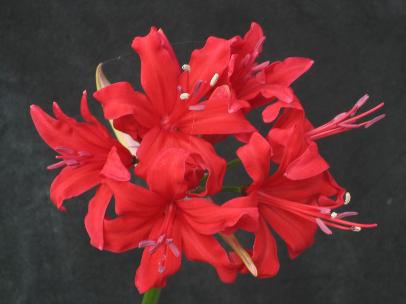Nerine Registrar Introduction
The Nerine and Amaryllid Society is the Registration Authority for genus Nerine
The International Society for Horticultural Science (ISHS) has appointed the Nerine and Amaryllid Society (NAAS) as the sole worldwide International Cultivar Registration Authority (ICRA) for Nerine. The ICRA is expected to follow the 9th edition (2016) of the International Code for the Nomenclature for Cultivated Plants (ICNCP), and exercise its role by the appointment of a Registrar.
The ICRA has a dual role – to maintain a reference Check List of known cultivar names (current and historic), and to maintain a Register of cultivars. It also has an obligation to publish this information (in print) and is encouraged to make it freely available on the internet.
Those wishing to Register a cultivar and those referring to the cultivar check list need not be members of the NAAS.
Historically very few Nerine cultivars have been Registered. The Check List contains over 3000 names.
NAAS maintains a database of Nerine cultivar information. Access is available on request.
NAAS also provides access to register a cultivar online, or upload cultivar details online, again on request.
ICRA (courtesy of Wikipedia):
Scope of authority:
The system is both voluntary and non-statutory and it does not confer any legal protection over the name or the plant. Such protection has to be sought through statutory schemes such as  plant breeders' rights, sometimes called "plant patents," which differ between counties. The ICRA system is in effect the horticultural world’s attempt at self-policing of nomenclature and is truly international in its scope. ICRAs are not responsible for assessing the distinctiveness of the plant in question.
plant breeders' rights, sometimes called "plant patents," which differ between counties. The ICRA system is in effect the horticultural world’s attempt at self-policing of nomenclature and is truly international in its scope. ICRAs are not responsible for assessing the distinctiveness of the plant in question.
How it operates:
The ICRA system depends upon the co-operation of all involved with the creation and marketing of new plants. Normally, all that is required is the submission of the plant name and any other required data to the ICRA, and in most cases there is no direct cost to the applicant. Although an ICRA is entitled to charge a small fee to cover their costs, most provide this indispensable service without charge.
The ICRA will:
- check each new name (termed an epithet) to ensure that it has not been used before
- validate that in all other respects it is in accord with the ICNCP
- notify the registrant of the success, or not, of the application
Applicants must understand that registration will be refused if the name has been used before and should always await the ICRA’s decision before implementing any marketing for the plant, the ICRA are not responsible for any losses incurred in this respect.
Formally establishing names:
Each ICRA is also charged with the responsibility of ensuring that new names are formally established (i.e. published in hard copy, with a description in a dated publication). Establishment in this context is an important concept since it is only after such publication that the name has precedence for its use for a particular plant.
Whilst the ICRA will ensure through its own publications that names are established, it is recommended that registrants should not necessarily rely on this and should also try to ensure that their new names are securely established as soon after registration as possible.
